
How to Spot Fake Money
Understanding how to spot fake money is an important skill for anyone who handles cash. In addition to supporting crime, failing to spot fake notes could have a serious impact on your business.
At any one time, there are around 3.7 billion banknotes in circulation, with a face value of around £70 billion. Of these, less than 0.05% are fake notes. In 2017, £10 million worth of fakes notes were removed from circulation. So while they may not be common, fake notes are common enough to affect the bottom line of the average business.
The vast majority of counterfeits are discovered before they go back into circulation, when retailers and the banking system are sorting them. Fake notes are typically removed from circulation quickly, often after a single use. Here are a few tips on how to spot fake money when you’re handling cash.
When should you check for fake notes?
In order to protect your business, it’s best to check notes as soon as you receive them, before giving over the goods you’re selling. Don’t worry about offending your customer, checking a note doesn’t take long and will protect your business in the long run. It’s especially important to be vigilant in situations where you’re busy or you cannot see the notes clearly, such as a busy bar or club.
How to spot fake £5 notes
New £5 are made from polymer, rather than paper. Their new design is packed full of security features that help fight against forgeries. Here’s how you can spot a fake £5 note:
- Check the polymer and print. By running a finger across the front of the note, you should feel raised print across the words “Bank of England”. Microlettering on the note should spell out the value of the note in words and numbers.
- Check the print quality. The lines and colours need to be sharp and clean. Any blurring or smudges in the print could indicate a fake $5 note.
- On the front of the note, at the top, you’ll find a silver foil patch. An image of the coronation crown should appear in 3D on the foil. When tilted to catch the light, make sure you can see a rainbow effect. Another silver patch can be found at the bottom of the note. When tilted, you should see the word “Five” change to “Pounds”.
- New £5 notes have a see-through window. You should be able to clearly see the Queen on the front and the words “£5 Bank of England” printed twice around the edge. Over the window you should see a gold image of the Elizabeth Tower on the front. On the back, it should be silver. Again, when tilted, you should see the rainbow effect.
- On the back of the note, you should find a green patch. Letters inside the patch spell BLENHEIM.
- Using a high quality UV detector, you should see a number 5 appear in bright red and green.
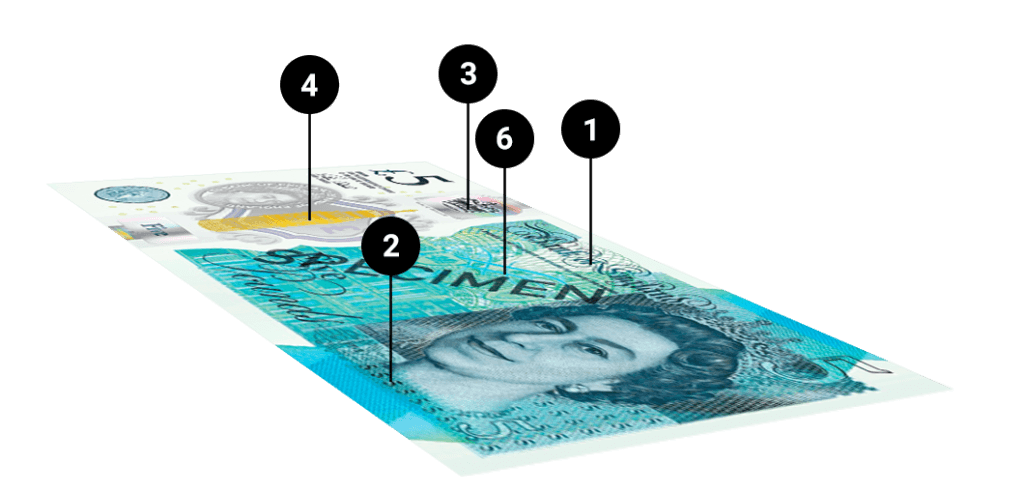
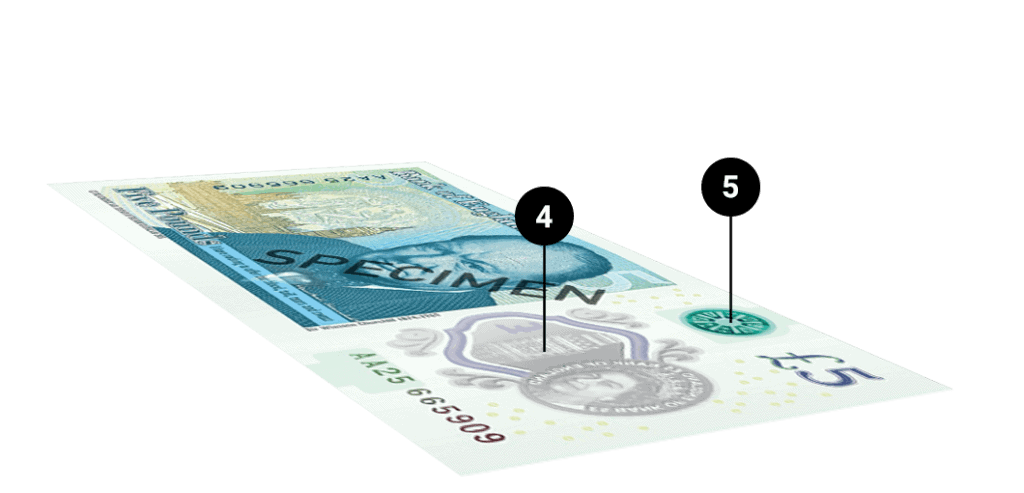
You can spot a fake £5 note if it is missing one of these security features, or the quality seems lower than other notes.
How to spot fake £10 notes
The new £10 is also made form polymer and features many of the same features as the new £5, including raised lettering, foil patches and a UV feature. The new £10 also has a few unique features. To spot a fake £10 note, be sure to check the following:
- Check the polymer and print. Again, you should be able to run a finger across the front of the note and feel the raised “Bank of England” words. New £10 notes also feature raised dots in the top corner. These serve double-duty as an aid for the blind and as an additional security feature. The microlettering on the note should spell out the value of the note in words and numbers.
- Check the print quality. If the lines are blurry or the colour has run, you’re likely in possession of a fake £10 note.
- The foil patches should be the same as the fiver, but the words “Ten” and “Pounds” replace the “Five/Pounds” for obvious reasons.
- The see-through window should have a picture of the queen on the front and the words £10 Bank of England. Rather than the Elizabeth Tower, the new £10 note has an image of Winchester Cathedral on it, featuring its famous broken stained glass window. Beneath the Cathedral should be a £ symbol, which is silver on the front and copper on the back. Next to the window, genuine £10 notes feature a quill, which changes colour from purple to orange when tilted.
- On the back of the £10 note is a book-shaped foil patch. This copper coloured patch has the letters JA printed on it.
- Using a high quality UV detector, you should see a number 10 appear in bright red and green.
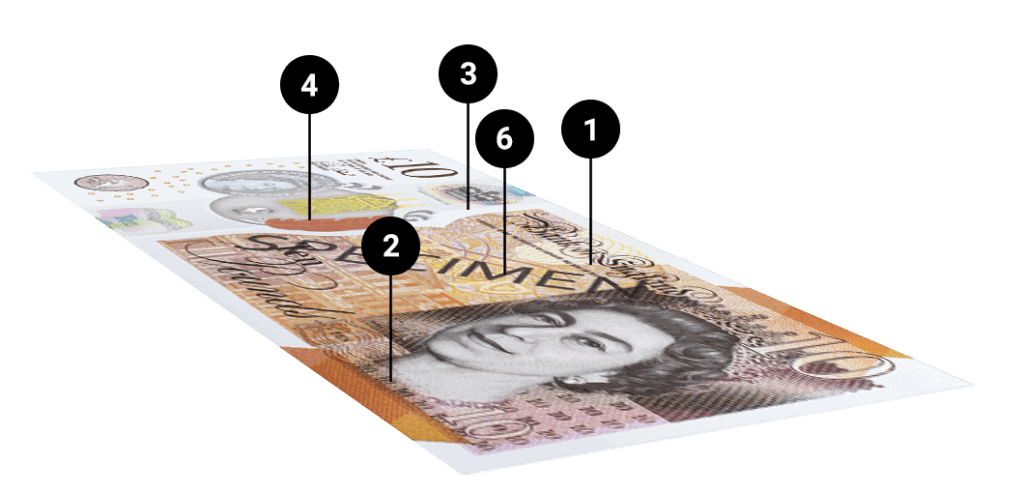
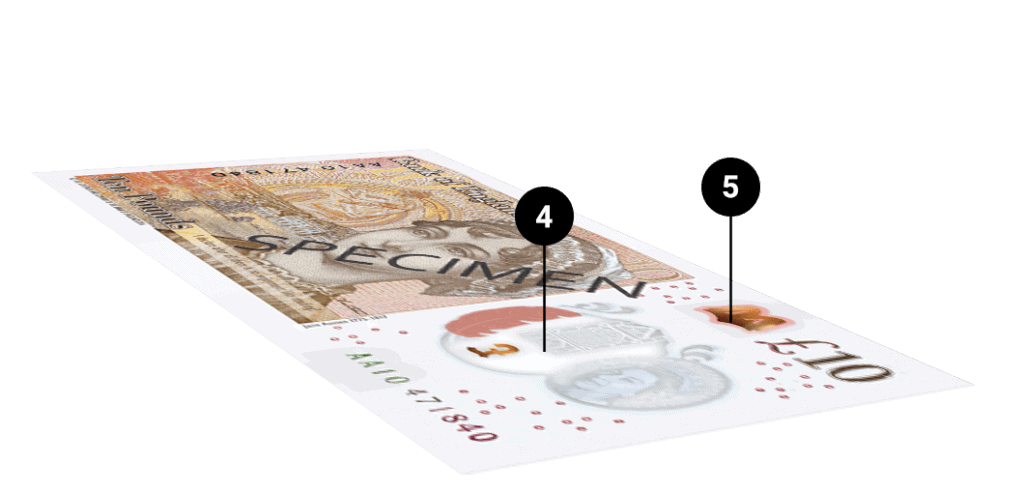
How to spot fake £20 notes
In 2020, the Bank of England will issue polymer £20 notes. Until then, we are still using the paper note. Known as the “Adam Smith £20 note”, this is the most commonly forged UK banknote. As such, these are the most important notes to check when looking for fakes.
In addition to checking the quality of the paper and the print, there are two quick and easy ways to check for fake £20 notes. Firstly, tilt the note from side to side. The hologram on the front should change from a £ symbol to a 20. Secondly, check the watermark by holding the note up to the light. Next to the Queen’s portrait, you should see a bright “£20”. Fake £20 may have a watermark, but it is often dull in contrast.
£20 notes also include a variety of more sophisticated security measures. These include multicoloured foil image of Adam Smith, raised print, UV “20” like the £10 and £5 notes and microlettering. £20 notes also feature a metallic thread. By holding the £20 note up to the light, you should see a £ symbol appear within the contrasting colours.
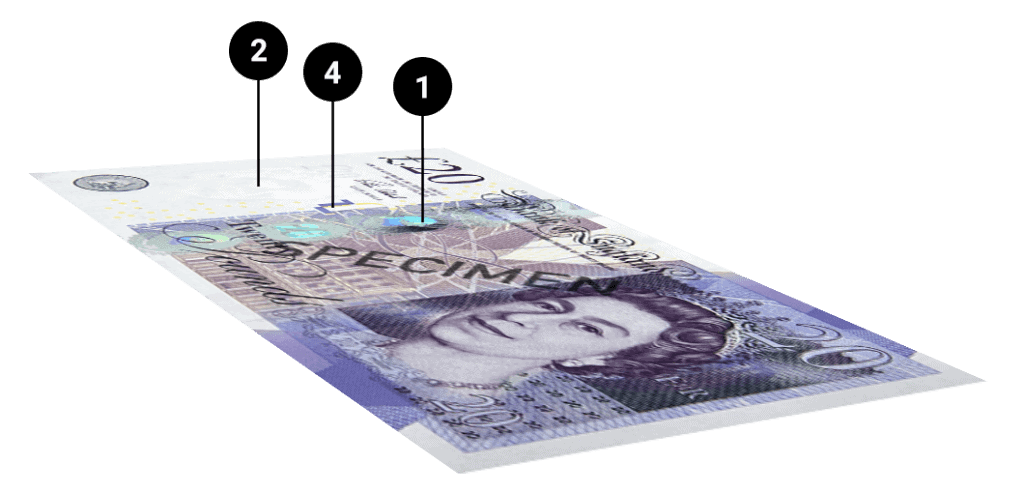
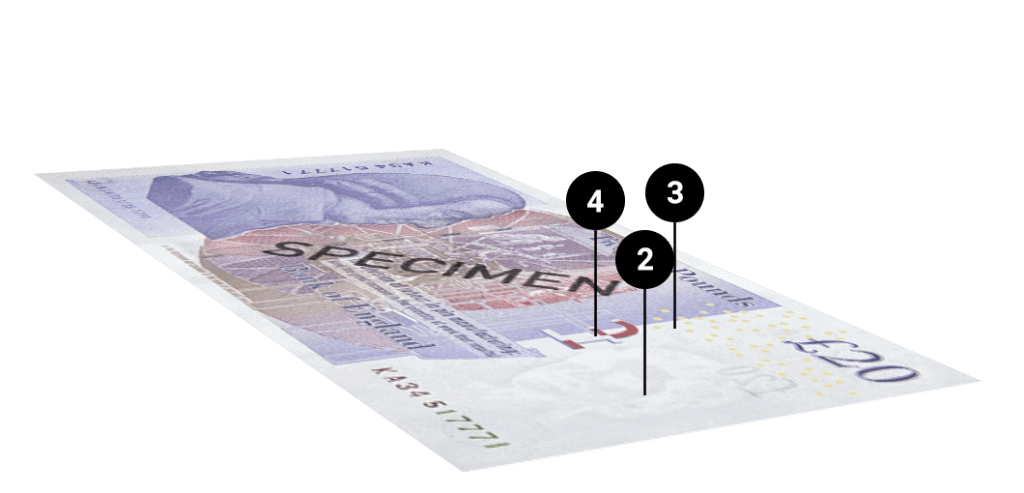
How to spot fake £50 notes
£50 notes are more common than people think, especially in pubs and wholesalers. We don’t know when a polymer £50 note will be released, so in the meantime we have the paper £50 note. The £50 has the same security features as the £20 paper note.
When checking for fake £50 notes, check the quality of the paper and the ink. You’re looking for clean lines, no blurring and raised letters. Holding the note up to the light should reveal a bright “£50” watermark. The hologram, known as the motion thread, should flip between “£” and “50”.
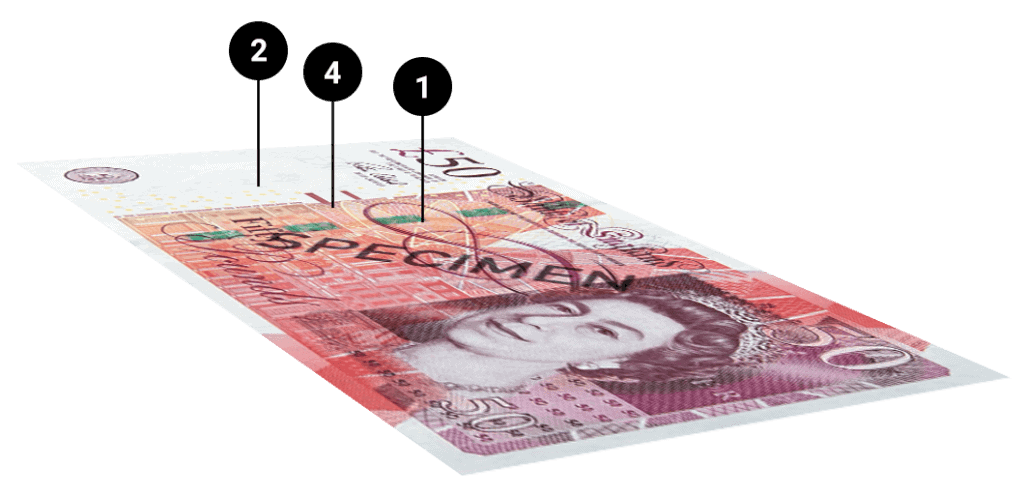
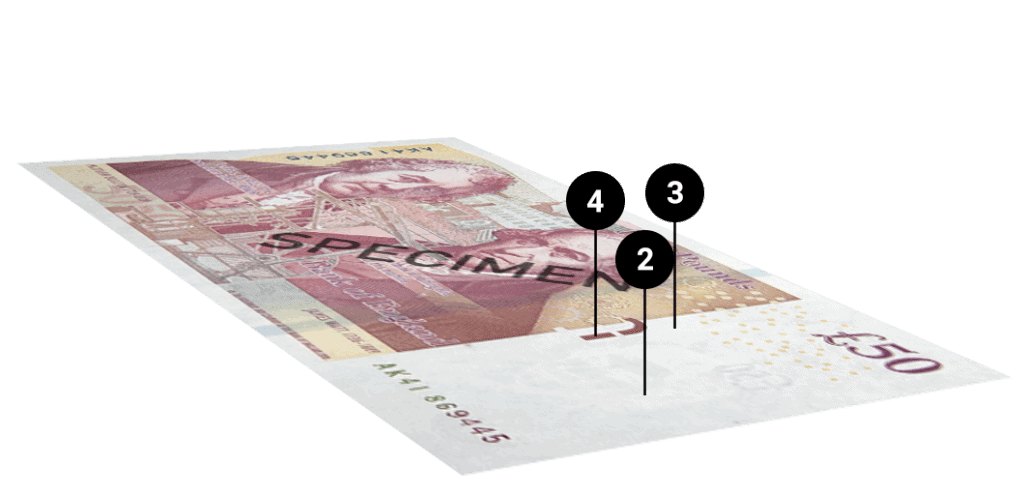
What to do if you discover a fake banknote
It’s a criminal offence to knowingly hold onto or pass on counterfeit notes. So, if you spot a fake note, take it to the police as soon as possible. If the police don’t need it to support a criminal investigation, you can hand it in at your local bank for reimbursement.
Other ways to spot fake notes
In addition to checking the notes themselves, there are other ways to spot fake money. Be extra vigilant if the item being bought is far cheaper than the notes the customer hands over. Spending a £20 note on a purchase that only costs a few pounds is one of the ways criminals can make money from their counterfeit notes.
Bars and clubs are prime targets for circulating fake notes. They are often busy and poorly lit, so criminals take advantage of this to slip fake notes past staff too busy to check. Having a UV detector at every payment device will help you spot more fake notes.
The best way to spot a fake note is to use the latest banknote counters and counterfeit detection technology.
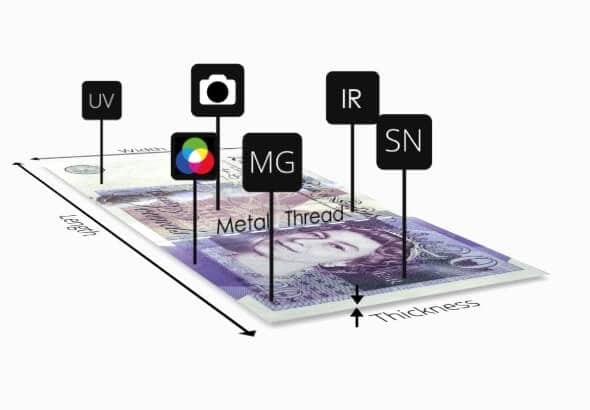
ZZap banknote counters automatically verify your notes so you don’t have to worry about it. No manual checking means no time wasted and no customer confrontations. If a counterfeit is detected our banknote counters automatically reject the banknote without even stopping counting. After counting, our note counters can report the reason why each banknote was rejected.
Security features are incorporated into every currency to prevent counterfeiting. Our banknote counters check a variety of security features on each banknote using the following advanced detections:
- Ultraviolet
- Magnetic
- Half-note
- Width
- Thickness
- 3D
- Infrared
- Metal thread
- Serial number
- CIS
Automatic, effortless and seamless, today’s banknote counters and counterfeit detectors are able to identify fake money instantly, saving your business time and money. Check out our range today.
Related Articles
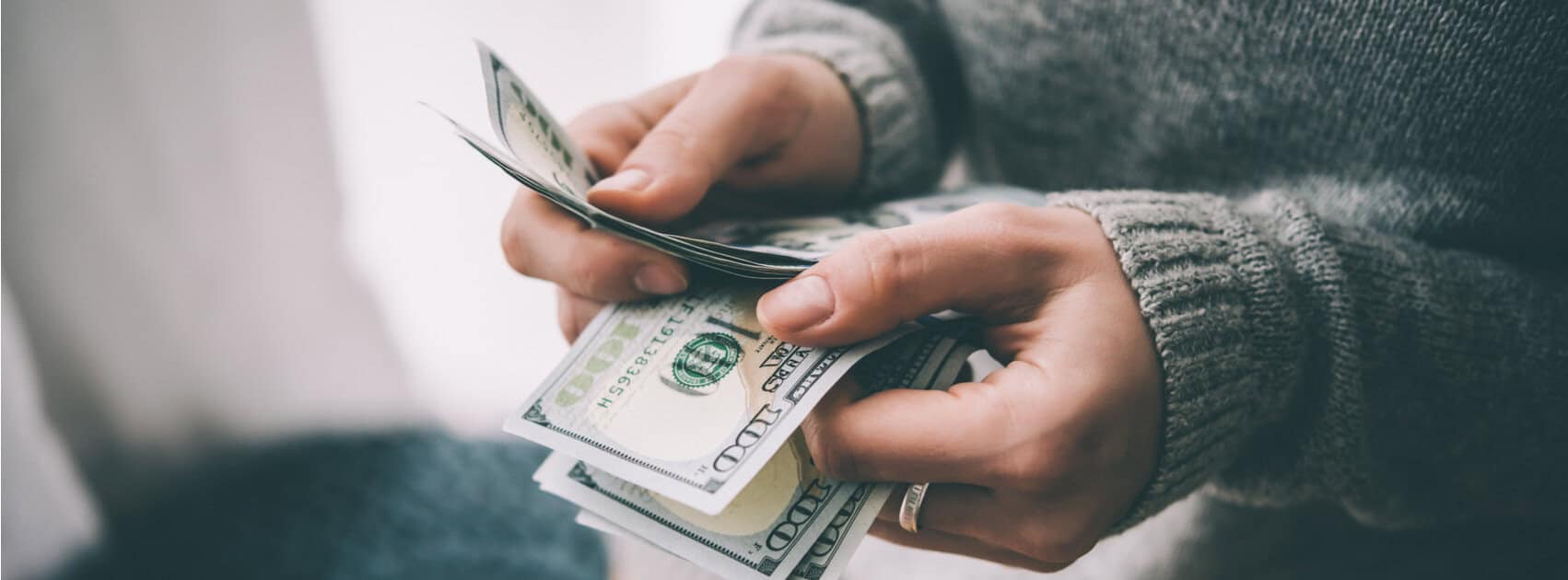
How to Count Money Fast
Counting cash is important for anyone who handles money on a regular basis. Learn how to count cash quickly with our list of useful tips and tools.
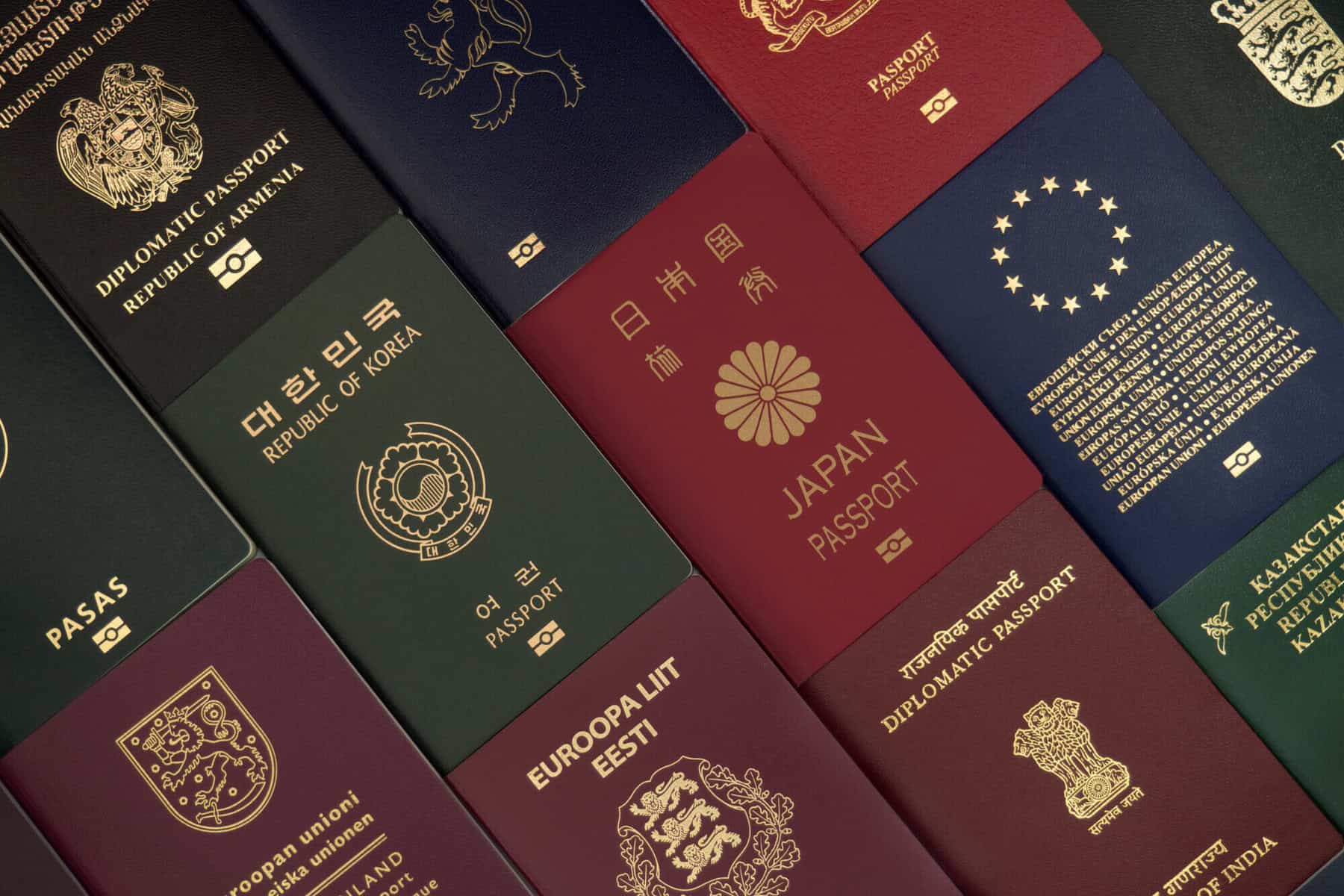
How to Spot a Fake ID
The black market sale of fake IDs is booming as legislation changes force people to declare their legal status. This influx of counterfeit passports and IDs increases the likelihood of people encountering them. Here’s how you can spot them.








